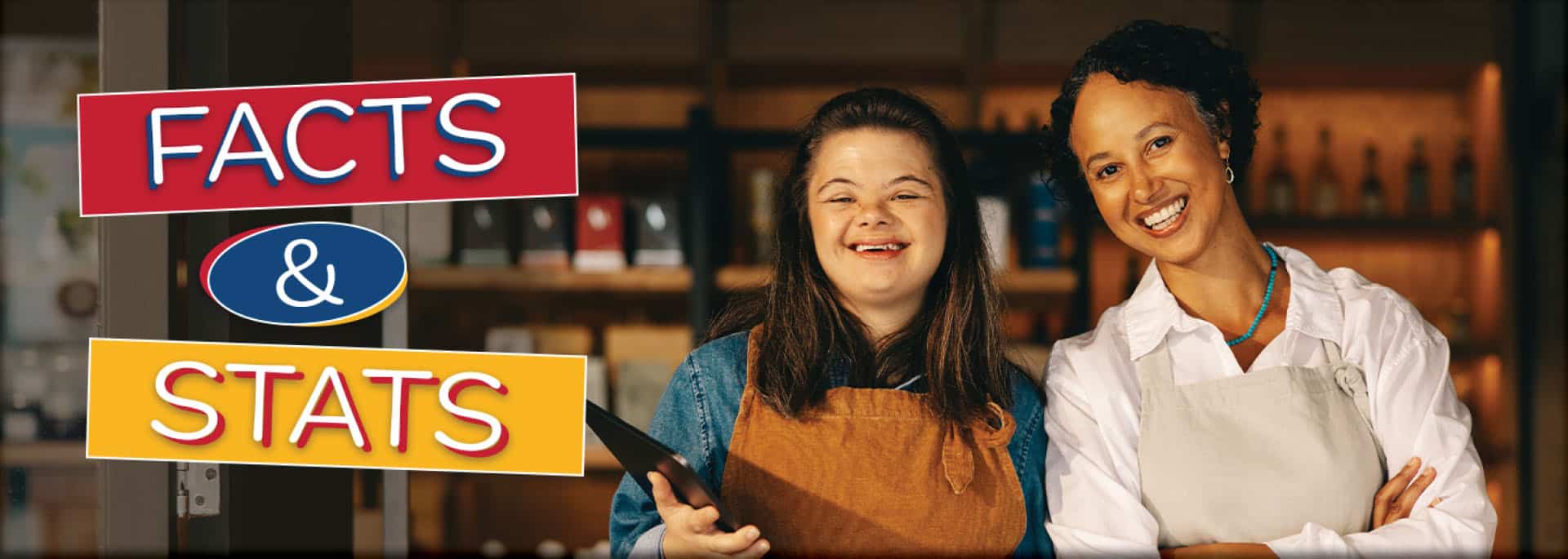
What is trisomy 21?
Down syndrome is a genetic condition. Generally, children receive 23 chromosomes from their mother and 23 from their father. A baby with Down syndrome will have three copies of the 21st chromosome instead of two. This is why Down syndrome is also referred to as Trisomy 21. Each cell will have 47 chromosomes as opposed to the typical 46 chromosomes.
How common is Down syndrome?
Down syndrome is the most commonly occurring genetic condition, affecting approximately 1 out of every 700 births of people of all ages, races, and economic levels. There are over 350,000 individuals living with Down syndrome in the United States who are vibrant and enthusiastic members of their families and communities, and 6,000 babies with Down syndrome are born in the United States every year. Almost 40% of Americans know someone with Down syndrome! If a woman has one child with Down syndrome, her risk for having a second child with Trisomy 21 is about 1 in 100 up until age 40.
Is Down syndrome inherited?
The additional partial or full copy of the 21st chromosome that causes Down syndrome can originate from either the father or the mother. In most cases, it is not an inherited condition but instead is a result of a modification during fetal cell division. It is possible for a child to inherit translocation Down syndrome, which takes place when a parent’s chromosomes have rearranged genetic material.
What causes Down syndrome?
All people with Down syndrome have an extra portion of chromosome 21 in some or all of their cells. This genetic material modifies development and results in the characteristics associated with Down syndrome. The source of the extra or partial chromosome is still unknown and maternal age is the only influence that has shown a correlation with having a baby with certain types of Down syndrome (nondisjunction or mosaicism), however 80% of all children with Down syndrome are born to women under the age of 35. There is no conclusive research indicating that Down syndrome is caused by other parental activity or environmental factors.
Are there different types of Down syndrome?
Trisomy 21, also referred to as nondisjunction, accounts for 95% of Down syndrome cases. There are two other forms of Down syndrome that are quite rare – mosaic and translocation. Translocation Down syndrome accounts for about 3% of affected children and is the only type of Down syndrome that can be inherited. In this case, the baby will have three copies of chromosome 21, but one attaches to another chromosome. In trisomy 21, the extra copy is separate. Mosaic Down syndrome impacts about 2% of affected babies. It happens when an extra copy of chromosome 21 is present in only some of the body’s cells. These types of diagnosis can only by performed via karyotype, which visually displays a baby’s chromosomes. All people with Down syndrome experience some cognitive delays, as well as a host of strengths and talents specific to each individual.
What are the physical characteristics associated with Down syndrome?
Although children and adults with Down syndrome may share some common features, they really resemble their immediate family members more! Some common features among people with Down syndrome are short stature, round face, almond-shaped and up-slanting eyes.
How will a baby with Down syndrome affect my family?
A 2011 Harvard survey entitled “Self- Perceptions from People with Down Syndrome,” found that 88 percent of siblings of children with Down syndrome feel that they are better people for having had their brothers and sisters; and other studies have found that children with Down syndrome have strong adaptive skills and that their parents tend to divorce less than the parents of children without Down syndrome. Every family is unique. Since a range of cognitive delays are common in Down syndrome, developmental intervention and community support is important. Providing accommodations and a creating a supportive and stimulating home environment will help maximize your child’s innate strengths and talents.
How do medical issues affect people with Down syndrome?
Having Down syndrome is associated with an increased risk for certain medical conditions including congenital heart defects, respiratory problems, hearing and vision problems and thyroid conditions. Other predispositions may include sleep apnea, Alzheimer’s, celiac disease, autism, and seizures. Many of these conditions can be managed with expert medical care and medication. Thanks to advancements in treatment, the majority of people with the condition will live to age 60 or longer.
Can people with Down syndrome have jobs?
57% of adults with Down syndrome are employed according to National Center on Health, Physical Activity and Disability (NCHPAD). Adults with Down syndrome can be employed in a variety of positions – in banks, corporations, hotels, hospitals, nursing homes, offices and restaurants. They work in the music and entertainment industry, in clerical positions, childcare, the sports field and the computer industry, just to name a few! Like anybody else, people with Down syndrome want to have a job where their work will be valued.
Are people with Down syndrome always happy?
People with Down syndrome have feelings just like anyone else. They experience the full range of emotions. They respond to positive expressions of friendship and are hurt and upset by inconsiderate behavior. Brian Skotko, a Harvard-trained physician and researcher, published a groundbreaking survey revealing that people with Down syndrome have a very high level of satisfaction in their lives and are generally very happy people. Similarly, family members of people with Down syndrome also rank high in levels of personal fulfillment.
